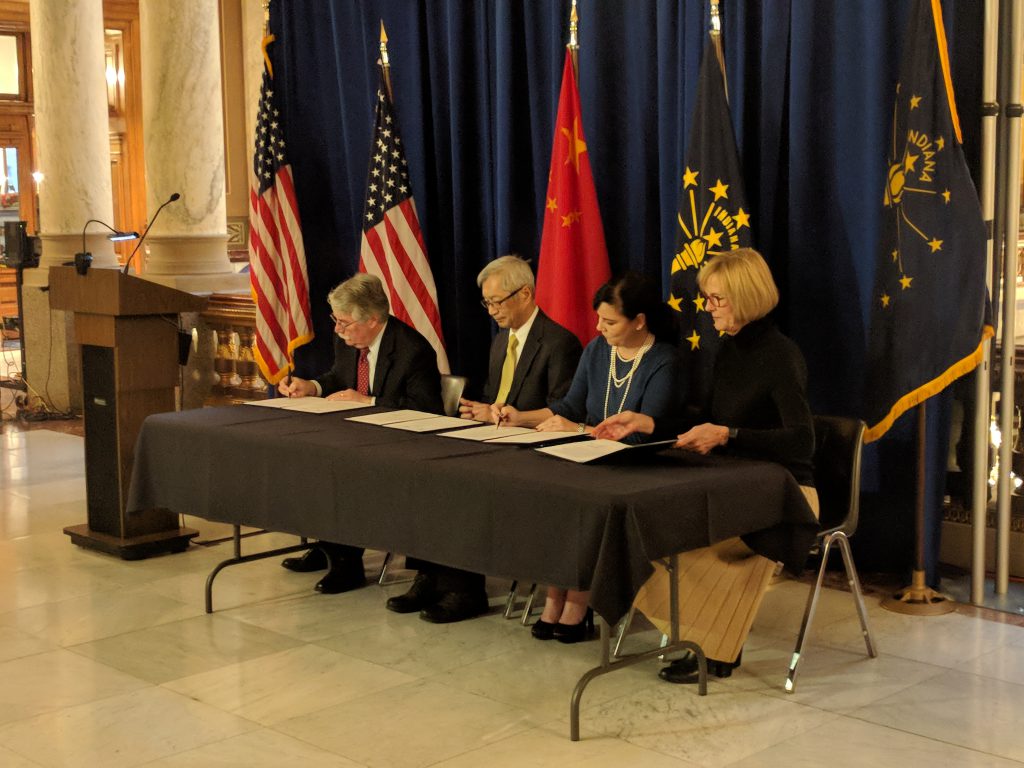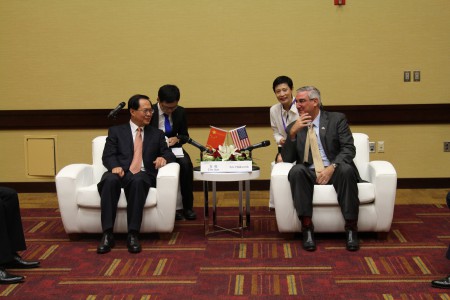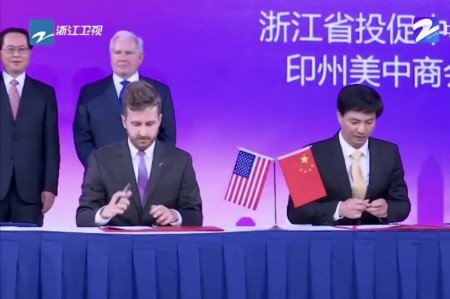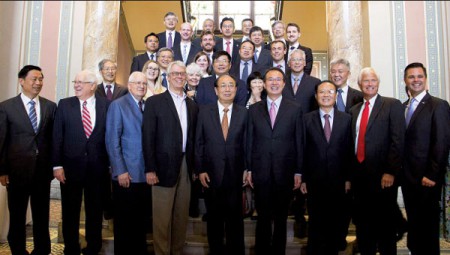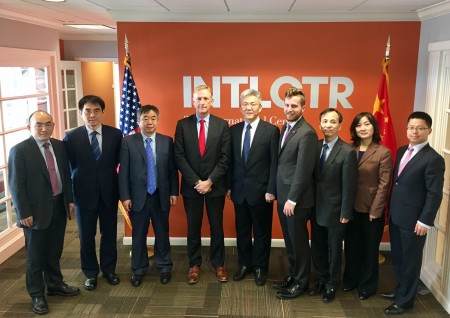Thilo Hanemann and Daniel H. Rosen | January 17, 2018
Headline Investment Dropped by 35%
RHG’s China Investment Monitor recorded 141 Chinese direct investment transactions in the US worth $29 billion in 2017. This represents a drop of 35% drop compared to the record year 2016 but is still the second-largest year on the record for Chinese investment in the United States.
The split between mergers and acquisitions (M&A) and greenfield projects remained similar to previous years, with M&A accounting for 98% of total investment. In terms of industries, the biggest losers were entertainment, consumer products and services and real estate and hospitality. Investment remained stable or grew in health and biotech, ICT and transport and infrastructure. While sovereign and state-owned players gained globally in 2017, private investors continued to account for about 90% of investment in the US. More details on the composition of 2017 investment are available through our China Investment Monitor.

New Deal-making Down More than 90%
The completed transactions perspective does not adequately portray the drastic fall-off in Chinese investment activity throughout the year. More than half (60%) of the 2017 transaction value stemmed from the completion of deals announced during the 2016 investment boom. Considering new activity in 2017 only, the decline was much sharper: The value of newly announced Chinese acquisitions in the US fell to $8.7 billion in 2017, a drop of more than 90% from 2016 and the lowest level in six years.

Friendly Fire: Chinese capital controls
The principal factor behind the decline in China-to-US deal flow was Beijing’s changing stance on outbound capital flows. In late 2016, Chinese regulators launched an informal crackdown on “irrational” outbound investment to contain large-scale capital outflows that were melting down China’s reserves. In August, these informal policies were codified through a new OFDI regime based on lists of six types of encouraged investments, five types of restricted investments and five types of prohibited investments. Some of the restricted sectors have been important drivers of Chinese FDI in the US in recent years, including real estate and hospitality (which accounted for 36% of total US investment in the past 3 years) and sports and entertainment (another 7% of total investment in the past 3 years).
In May 2017, Chinese regulators also began to scrutinize large private conglomerates’ outbound investment activities as part of a broader effort to clean up risks and reduce leverage in China’s financial sector. Many of these investors have been aggressive overseas dealmakers in the US in recent years, including entertainment empire Wanda and conglomerate HNA Group (which was single-handedly responsible for almost one third of total Chinese investment in the US in 2015-2016).
Globally, Beijing’s regulatory crackdown triggered the first drop in Chinese outbound FDI after more than a decade of continuous growth: China’s Ministry of Commerce recorded a drop of 29% in non-financial outbound FDI for the full year 2017, the first decline since 2006. Other official Chinese datasets recorded an even sharper decline: the State Administration of Foreign Exchange recorded a drop of 64% in the growth of Chinese FDI assets in China’s balance of payments for 1Q-3Q 2017.
In the United States, the informal crackdown triggered an immediate drop-off in Chinese deal activity (Figure 3). In addition to curbing new activity, Beijing’s crackdown also resulted in the breakup of several pending US transactions, including Wanda’s $1 billion acquisition of Dick Clark Productions or Anhui Xinke’s $345 million acquisition of a stake in Voltage Pictures.

Security Screenings Bog Down US Investment
The second factor explaining the 2017 decline in both completed and announced transactions was greater US regulatory pushback. An unprecedented number of Chinese deals were delayed or abandoned in 2017 as parties failed to obtain approval from the Committee on Foreign Investment in the United States (CFIUS), which screens foreign acquisitions for potential national security risks.
Growing CFIUS deal risk was driven by two factors: first, the slow progress with government transition left many leadership positions unfilled for the better part of 2017, causing delays and a cycle of re-submissions. Second, and more importantly, CFIUS seems to have broadened its approach for reviewing Chinese deals, taking into consideration a broader array of criteria when assessing security risks, for example state-sponsored M&A activity to obtain certain technologies or concerns about data protection.
Prominent transactions that were abandoned during the year because of unresolved CFIUS concerns included Canyon Bridge Capital’s acquisition of Lattice Semiconductor, Zhongwang’s acquisition of Aleris Corp, Orient Hontai’s acquisition of a stake in Applovin and HNA’s acquisition of a stake in Global Eagle Entertainment. In early January 2018, Ant Financial abandoned its proposed acquisition of Moneygram due to CFIUS concerns. Financial regulators also stepped up scrutiny of Chinese investors in 2017, with the SEC freezing the sale of the Chicago Stock Exchange to a consortium led by China’s Chongqing Casin Enterprise Group, and state financial regulators inquiring into Anbang’s acquisition of Fidelity & Guaranty Life. If completed, these deals would have added at least another $7-8 billion to the 2017 headline figure.
In addition to busting pending transactions, growing US regulatory assertiveness and uncertainty also weighed on new Chinese deal making through the end of the year. This is particularly apparent when looking at the investment momentum in the second half of 2017: While global Chinese outbound investment activity rebounded globally and in other OECD economies (most importantly the EU and Canada), it remained depressed in the US (Figure 4).

Outlook: From Bad to Worse?
Chinese commercial appetite for US investment expansion is stronger than ever, but regulatory hurdles won’t fade in Beijing and will almost surely increase in the US.
In China, the restrictive outbound investment regime will remain in place. Worries about capital flight have subsided and Beijing is putting on a brave face about 2018 expectations. However, the table looks set for a return of the conditions that fueled capital flight during the past two years: rising US growth and interest rates, and a China unable to raise rates significantly without causing corporate insolvencies. While Beijing has loosened the leash on corporate outbound investment a bit in the second half of 2017, we expect regulators to remain in a conservative mode, trying to keep capital outflows at “healthy” levels and steering aggregate investment levels by influencing individual deals as needed.
Even if domestic and global macroeconomic conditions permit Beijing to loosen capital controls this year, changes on the US side may stymie a recovery in bilateral flows. The 2017 China-US OFDI downturn was overwhelmingly due to China’s capital controls, with tighter US screening playing just a supporting role. But 2018 will be a different story. A series of 2017 and early 2018 deal failures suggests CFIUS concerns are already swelling. The Foreign Investment Risk Review Modernization Act, or FIRRMA, is making progress on Capitol Hill and appears likely to come to a vote this year. China epitomizes the “countries of special concern” the bill is concerned with, and in expanding the types of transactions subject to screening, a significant share of the marginal growth in foreign investment in the US would be treated with suspicion.
Beyond FDI policy and screening per se, the Trump Administration issued a new National Security Strategy in the final days of 2017 which redefined China as a strategic rival, removed a presumption of engagement and knit economic interaction into the security calculus in a profound way. This change to a confrontational economic-security policy will almost surely sour the US-China investment climate, with negative implications for future flows. The presumption that China is actively pursuing a zero-sum campaign toward the United States – as suggested by the new Administration document – will result in more onerous treatment for many Chinese firms operating in the US, even when they are not in sectors of national security concern. President Trump’s State of the Union on January 30th and decisions on several trade cases in coming weeks will signal just how aggressive this shift will be.
The extent of strategic re-orientation will make a huge difference in future Chinese investment flows to the US. If it were just a matter of narrowly-defined national security, the US could redouble its diligence screening for risks and still enjoy a great expansion of Chinese investment: today’s levels are not high in proportion to the size of our two economies. National security and ample deal flow are not an either-or. But a draconian effort to push back on China’s economic footprint in America that transcends discreet national security concerns will forfeit these opportunities.
SOURCE: http://rhg.com/notes/chinese-fdi-in-the-us-in-2017-a-double-policy-punch

